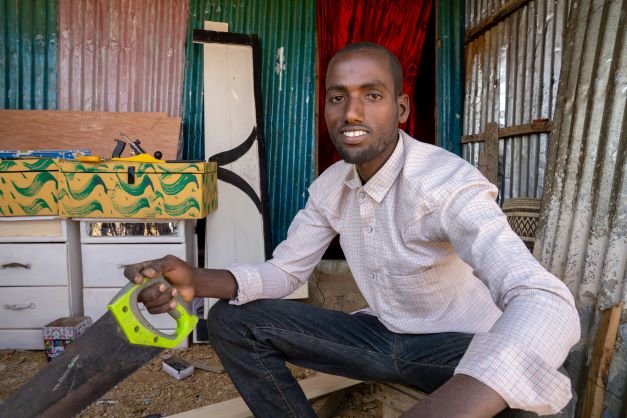In the heart of Baidoa, Somalia, a quiet transformation is unfolding, one house, one skill, and one determined individual at a time.
Daahir, a father of two and the youngest of five siblings, is among thousands of Somali returnees rebuilding their lives after years of displacement caused by war, drought, and economic hardship.
His story is a powerful reflection of how vocational training is restoring hope and livelihoods in communities battered by crisis.
Born in Somalia’s Bay Region, Daahir's early life was marked by instability. His father divorced his mother when he was just five, leaving the family in the care of an uncle who later relocated them to Jubaland.
There, survival became a daily struggle. Consecutive failed rainy seasons left the region parched and desperate. As food grew scarce and conflict intensified, the family made a difficult decision, to flee across the border into Kenya.
For Daahir, Kenya offered a temporary reprieve. Though the transition was difficult, especially in the harsh heat of the northern refugee camps, life eventually stabilized in Dadaab, where his family received food, education, and access to healthcare.
“Life was good,” he remembers, recalling the relative safety and support they found there.
In 2017, at the age of 18, Daahir and his family returned to Somalia, encouraged by reports of improving conditions and a growing sense of peace.
According to Concern Worldwide, they settled in Baidoa, one of several cities hosting large numbers of returnees and internally displaced people.
But coming home brought new challenges. With few job opportunities and mounting pressure to provide, Daahir contemplated migrating again or even joining an armed group.
“Before I did this work, I was just sitting at home. I had nothing to do,” he says.
That changed when he connected with Concern Worldwide during the COVID-19 pandemic.
Through a vocational training program supported by the UK’s Foreign, Commonwealth & Development Office (FCDO), Daahir enrolled in a four-month carpentry course.
The training was practical, hands-on, and immediately life-changing. Upon completion, he secured an internship with a local engineer who mentored him in home construction.
“I didn’t want to be a soldier. Now I have a business. I earn money. I support my family. I built my own home. When I finish a building, I feel proud,” Daahir reflects.
Daahir is one of four million Somalis displaced by a complex mix of conflict, climate shocks, and poverty.
Many have ended up in informal settlements on the outskirts of cities like Baidoa and Mogadishu. For these communities, daily survival remains a struggle, access to food, water, and basic services is limited, and prospects for employment are slim.
Through targeted skills training in carpentry, masonry, electrical work, mobile phone repair, and beauty services, Concern and FCDO are helping displaced youth reclaim control over their futures.
These programs do more than teach technical skills, they offer an alternative to migration, conflict, and dependency.

